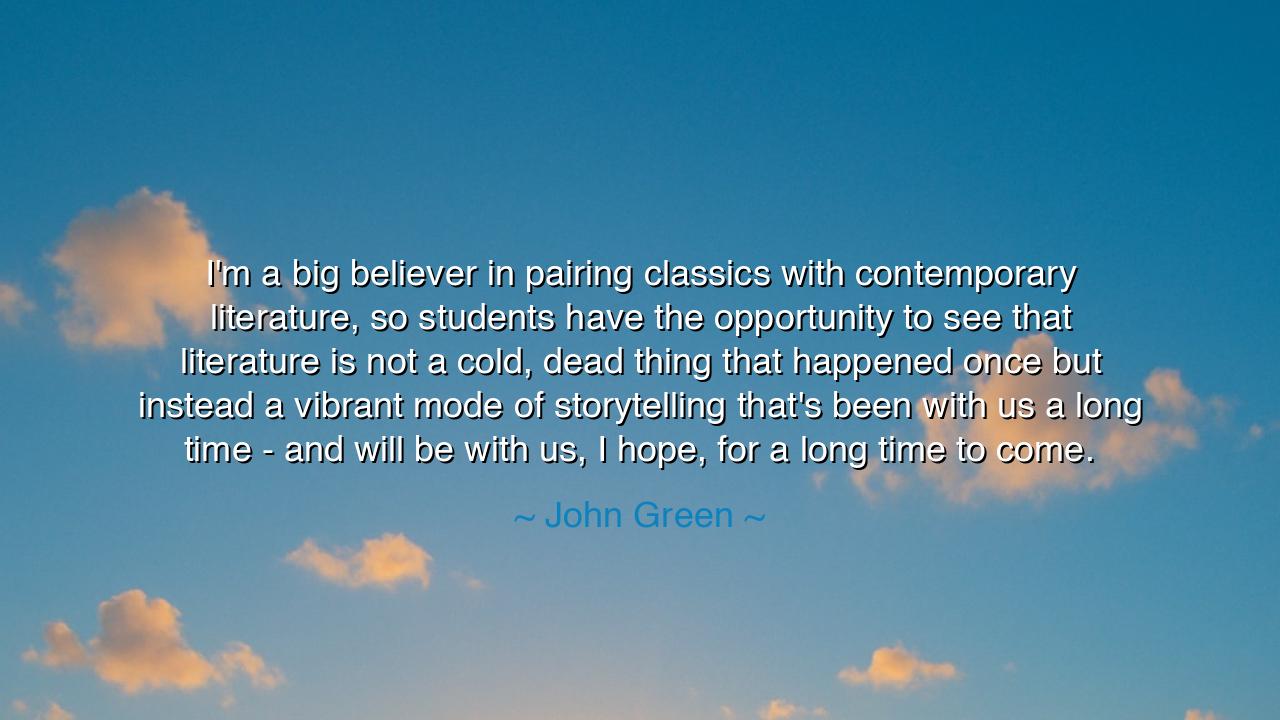
I'm a big believer in pairing classics with contemporary
I'm a big believer in pairing classics with contemporary literature, so students have the opportunity to see that literature is not a cold, dead thing that happened once but instead a vibrant mode of storytelling that's been with us a long time - and will be with us, I hope, for a long time to come.






“I’m a big believer in pairing classics with contemporary literature, so students have the opportunity to see that literature is not a cold, dead thing that happened once but instead a vibrant mode of storytelling that’s been with us a long time—and will be with us, I hope, for a long time to come.” So spoke John Green, a storyteller of our own age, whose words bridge the ancient and the modern like an arched stone spanning a timeless river. In his declaration lies a truth that the wise of every age have known: that literature—the voice of the human spirit—is not an artifact buried in dust, but a living flame that passes from generation to generation. To read is not to peer into the tombs of the past, but to stand among the eternal chorus of the living.
From the dawn of written word, storytelling has been the heartbeat of civilization. The classics, those mighty epics carved in ink and memory, speak to us across centuries not because they are old, but because they are true. Homer’s heroes, Dante’s pilgrims, Shakespeare’s dreamers—they walk still among us, disguised perhaps in jeans or digital screens, but their hearts are our hearts. And when we read the contemporary, when we hear the new voices rising from today’s streets and homes, we find the same pulse, the same questions of love, loss, courage, and purpose. Green’s wisdom reminds us that to study both is to see the full circle of human longing—ancient roots feeding present blooms.
Consider the tale of Alexandria, that city of light where the greatest library of the ancient world once stood. Within its walls were scrolls of philosophy, poetry, and history—each a whisper of humanity’s quest to understand itself. When fire consumed it, many wept that knowledge itself had perished. But they were wrong. For the words that mattered most did not burn—they had already taken root in hearts and minds, carried by travelers and storytellers across continents. This is the miracle of literature: that it survives not in buildings but in souls. Green’s belief in uniting the classics and the contemporary continues that same work—ensuring that wisdom never fossilizes, but breathes anew in every era.
The ancients told stories beside the fire; the moderns tell them through pages and screens. Yet the purpose has never changed—to make sense of the chaos of being alive. When students read only the classics, they may see the grandeur but not the movement; when they read only the contemporary, they may see the movement but not the roots. But when the two are joined, the light becomes whole. The old gives the new its depth, and the new gives the old its voice again. Thus, literature becomes not a relic of the past but a living bridge—a river carrying memory forward through time.
Think of Mary Shelley, who wrote Frankenstein when she was but a young woman surrounded by poets and philosophers who revered the ancient myths. In her story of man and creation, she wove Prometheus into the age of electricity. The classic and the modern became one, and from that fusion arose something eternal. She did what John Green speaks of—she proved that the stories of the past still live, waiting to be reborn through the hands and hearts of each generation.
The wise teacher, then, does not merely assign texts—he awakens voices. To pair the classics with the contemporary is to remind the young that they are not mere observers of history but participants in it. When they read The Odyssey beside The Fault in Our Stars, they begin to see that both tell of the same voyage: the search for meaning in a world of impermanence. And when they discover that their own lives echo the pages of both, they understand that literature is not about others—it is about them.
Therefore, remember this lesson: Literature is not a cold, dead thing. It is the breath of the human soul, and you are part of its unbroken line. Read the old with reverence, read the new with curiosity, and let both speak to you. Write your own story, for one day, it too may become a lamp to guide others through the dark. Keep faith in the power of words, as Green does—for so long as we tell and listen, the flame of humanity will not go out, but burn brighter across the ages.






AAdministratorAdministrator
Welcome, honored guests. Please leave a comment, we will respond soon